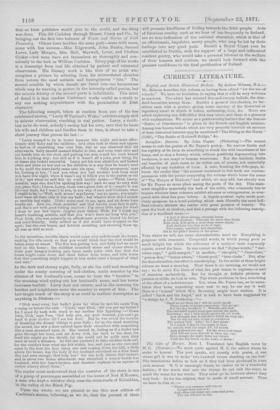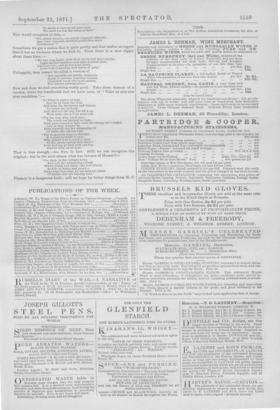The Odes of Horace. Book I. Translated into English verse
by M. C. (Nimmo.)—We must quote against M. 0. the author whom ho seeks to honour. The poet speaks, not exactly with praise, of one whose gift it was to mike two-hundred verses standing on one foot.' The translations before us look as if they had boon produced in some such manner. M. C. is amazingly fluent, he rushes on in a wonderful fashion ; if the words that suit the rhyme do not suit the sense, so much the worse for the words. They must go in, however absurd they may look. As for the original, that is made of small account. Thus. we have in Ode xi. :- " Wintor and summer will run on Longer than you Or I;
And when our years are come and gone, The sea will not be dry,
To death at last wo all must bow, • We need not ask the when or how."
Who would recognize in this,-
" Sou plums Memos, sou When Juppiter ultimtm, Qum nuue oppositis debilitat puniecibtes mare Tyrrheuum "1
Sometimes wo get a stanza that is quito pretty, and that makes us regret that it has no business where we find it. Thus there is a nice ripple about these linos :—
" We but sing feasts, with their mirth and their prattle, Light-handed maidens and light-hearted men ; ' Innocent love, and as inuooeut battle,
Love void of passion, aud battle of pain."
Unhappily, they cannot be called a version of
"Nos convivia nos preslin virginum, Seotie in luvenes unguibue ;tedium, Cantamits vacul sivo quid urlinur, Non pnetertrolItum loves."
Now and then we find something really good. Take those stanzas of a version, about the hundredth that we have soon, of "Vides ut alts stet nivo candiduni":— " so bring in plenty of logs
And let us thaw the cold, And heap the tire hotter and higher, To loosen its icy hold; And stint not the cup, but fill it up With wino that is four years old.
"For the rust, why, lot it rest; The winds are hashed on high, They have ceased to light with the strong sea's might, And as they wander by They scarcely stir the whispering lir Or make the old ash sigh.
"For to-morrow take no thought, It is sure for itself to care; Why should it be a cloud to thee, In tby sunny spring-time theta? Love and joy go best with the boy, Sorrow with silver hair."
That is free enough,—too free, in fact. Still, wo can recognize the original; but in the next stanza what has bocome of Horace?—
" Go, then, in the twilight hour,
And join tho whispering crowd, Whore youth and maid—she half afraid,
And be so brave and proud—
Moro kept true time, by the faithful chime Of hearts that are boating loud."
Fluency is a dangerous fault; still wo hope for better things from M. 0.































 Previous page
Previous page